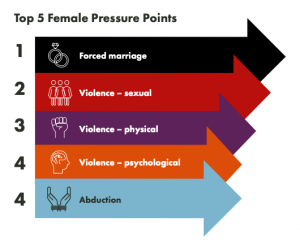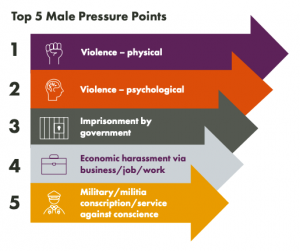Christian women face appalling levels of religiously motivated sexual assault and forced marriages in countries known to be hostile to the faith, Open Doors International reports in a new study on gender-specific religious persecution.
Physical and psychological violence are next in line, followed by the abduction of Christian females who also endure higher levels of “insidious, invisible violence behind closed doors,” the global watchdog ministry said.
“Today, more than 365 million people face real persecution and discrimination — unimaginable horrors every day — for following Jesus,” said Ryan Brown, CEO of Open Doors US. “And so many of these faithful followers are courageous women — wives, mothers, sisters and daughters — choosing this difficult path, choosing to stay true to the gospel, despite increased oppression and brutalities.”
Open Doors released the study on the heels of its 2024 World Watch List, which ranks nations it says are the 50 most dangerous to be Christian. North Korea, Somalia, Libya, Eritrea, Yemen, Nigeria, Pakistan, Sudan, Iran and Afghanistan were identified as having the largest number of attacks against churches.

The gender-focused study concentrates on religiously motivated personal violence against male and female Christians exacerbated in areas beset with armed conflict, environmental disaster, economic collapse or criminal activity, Open Doors explained. “One of the dynamics that can create insecurity is a high level of direct violence. … The consequences of insecurity are also significant; they include impoverishment, forced displacement and a normalization of violence.”
Anti-Christian violence also devastates families, especially in the ability to attain food, shelter and income, the report says. When violence and family structures “meet and intertwine in gender-specific religious persecution, the outcomes can have a devastating impact on the way someone experiences their everyday life.”
The oppression of Christians spans genders but often manifests differently for males and females, the study found. Women and girls “commonly experience persecution within the private sphere, often behind closed doors or perpetrated by those already known to them within their existing communities and relationships.”
An observer in Morocco noted women who convert from Islam to Christianity often are subjected to violence and other pressures to return to the family religion. “Both men and women are affected by this type of persecution but women are much more vulnerable and also less independent in the Moroccan society.”
The study identifies forced marriage as one of the most prevalent forms of religiously motivated violence against women and girls, occurring in 84% of watch-list nations. In many regions, the practice is used to force Christian girls or young women to return to Islam by matching them with much older Muslim men.
“Sexual violence and forced marriage are employed as a means of intimidation and control, with these strategies targeted at preventing Christian women and girls from pursuing their faith in Christ,” the report says. “In some areas of Mali, Democratic Republic of Congo, Kyrgyzstan and Mozambique, bridal kidnapping on faith-based grounds is a risk. Christian women and girls can be abducted in order to be forcibly married to soldiers and other non-Christians, frequently to Muslim men.”
 Christian women and girls also are subjected to rape and murder in mob attacks fueled by anti-Christian sentiment, the report says, citing India as a site for such violence: “The full scale of sexual violence incidents is masked, as many victims choose not to report attacks due to shame. Others live in fear of the authorities, who were widely reported to be bystanders to attacks and, in some instances, actively complicit.”
Christian women and girls also are subjected to rape and murder in mob attacks fueled by anti-Christian sentiment, the report says, citing India as a site for such violence: “The full scale of sexual violence incidents is masked, as many victims choose not to report attacks due to shame. Others live in fear of the authorities, who were widely reported to be bystanders to attacks and, in some instances, actively complicit.”
Boys and men were found to face faith- and gender-specific risks of brutality in 39 of the 50 World Watch list nations. Typically targeted for their perception as leaders and income providers, attackers seek to undermine their community standing through physical and psychological violence, imprisonment, economic harassment and forced military or militia service.
“Across many (although not all) of the countries under study, church leaders are predominantly male. As such, they are exposed to specific and violent persecution for their role as leaders and spiritual providers for the faith community,” the study says. “Pastors or church leaders may be ambushed as they are traveling between congregations, or in contexts where the church is underground, house group leaders may be hunted down and assaulted.”
Open Doors documented cases of torture and other forms of physical abuse to force men and boys to recant their Christian faith. “In military contexts and for those who have converted from another religious background, the risk of physical abuse and torture can be even higher and the costs even greater for those who choose the Christian faith. In eastern Democratic Republic of Congo, Christian men and boys in particular are subject to recruitment into militia groups, targeted kidnappings and killings.”
Male Christians are frequently subjected to psychological pressure through the monitoring of movements and phone calls in an effort to get them to reject the Christian faith, the study notes. “At times, the pressure is so intense that Christians may experience threats on their life.”
But the oppression of Christians can take many other forms, including denial of child custody, health care services, work privileges, the right to marry and numerous other legal rights.


